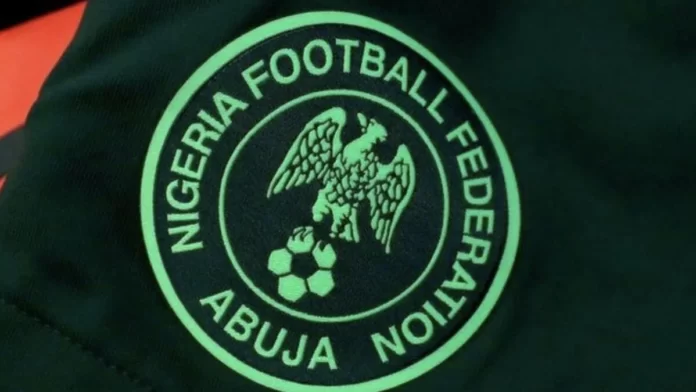Here Is The Easy Money-Making Trick Everyone Is Talking About! Learn More Here!
The History of the Nigeria Football Federation (NFF) is a fantastic one! As you know, football holds a special place in the hearts of Nigerians, and the NFF has played a pivotal role in the development and growth of the sport in the country.
Established in 1945, the NFF has evolved over the years, shaping Nigerian football and leaving a lasting impact on the international stage.
Foundation and Early Years
The Nigeria Football Federation, initially known as the Nigeria Football Association (NFA), was founded on August 21, 1945. The organization was established to oversee the administration and promotion of football in Nigeria.
It became a member of the Confederation of African Football (CAF) in 1959 and joined FIFA, the international governing body for football, in 1960.
During its early years, the NFA focused on organizing domestic competitions and developing local talent.
The federation played a crucial role in the establishment of the Nigerian Premier League (now known as the Nigeria Professional Football League) in 1972, which has since become the top-tier football league in the country.
Rise to Prominence
In the 1990s, Nigerian football began to make its mark on the international stage. The national team, known as the Super Eagles, achieved significant success, winning the Africa Cup of Nations in 1994 and 2013.
The NFF played a vital role in nurturing and supporting the team, providing the infrastructure and resources necessary for their success.
During this period, the NFF also focused on youth development, establishing various age-grade national teams.
The Nigerian U-17 team, known as the Golden Eaglets, won the FIFA U-17 World Cup a record five times, in 1985, 1993, 2007, 2013, and 2015.
These achievements helped to raise the profile of Nigerian football globally and solidify the NFF’s reputation as a leading football federation in Africa.
Challenges and Achievements
In the history of the Nigeria Football Federation, the NFF has achieved several notable milestones in the country’s football, contributing to the growth and success of the sport in the country.
1. National Team Success
The NFF has played a vital role in the success of the Nigerian national teams. The Super Eagles, the senior men’s national team, have achieved significant milestones under the guidance of the NFF.
They have won the Africa Cup of Nations three times, in 1980, 1994, and 2013, and have qualified for the FIFA World Cup multiple times.
The women’s national team, the Super Falcons, have also excelled under the NFF’s support.
They have won the Africa Women’s Cup of Nations a record eleven times and have represented Nigeria at several FIFA Women’s World Cup tournaments.
2. Youth Development
The NFF has placed a strong emphasis on youth development, recognizing the importance of nurturing young talent for the future of Nigerian football. The federation has established various youth development programs and academies to identify and train promising young players.
Through these initiatives, the NFF has produced several talented players who have gone on to represent Nigeria at both the national and international levels.
Notable examples include Austin Okocha, Nwankwo Kanu, and Jay-Jay Okocha.
3. Infrastructure Development
The NFF has played a significant role in the development of football infrastructure in Nigeria. The federation has been involved in the construction and renovation of stadiums across the country, providing better facilities for players and fans.
Additionally, the NFF has worked to improve training facilities and invest in the development of sports science and technology to enhance the performance of Nigerian footballers.
4. International Recognition
The NFF’s efforts have not gone unnoticed on the international stage. The federation has received recognition for its achievements and contributions to African and global football.
In 2018, the NFF was named the African Federation of the Year by the Confederation of African Football.
This recognition highlighted the federation’s commitment to excellence and its significant impact on Nigerian football.
5. Grassroots Development
The NFF has placed a strong emphasis on grassroots development, realizing the importance of nurturing talent from a young age. The federation has implemented grassroots programs and competitions to identify and develop young players from across the country.
These initiatives have helped to uncover hidden talent and provide opportunities for young players to showcase their skills and potentially progress to higher levels of the game.
Recent Developments
In recent years, the NFF has focused on enhancing the professionalism and governance of Nigerian football. The federation has implemented reforms to improve transparency and accountability, ensuring that the sport is managed efficiently and effectively.
The NFF has also prioritized grassroots development, investing in youth academies and talent identification programs across the country.
These initiatives aim to nurture young talent and provide them with the necessary infrastructure and coaching to succeed at both national and international levels.
The Future of the NFF
The Nigeria Football Federation continues to play a vital role in the development and promotion of football in Nigeria.
As the sport continues to grow in popularity and importance, the NFF faces new challenges and opportunities.
Looking ahead, the NFF aims to further strengthen its grassroots programs, improve the quality of domestic leagues, and enhance the performance of the national teams.
By investing in infrastructure, talent development, and administrative reforms, the NFF strives to ensure a bright future for Nigerian football.
The history of the Nigeria Football Federation is a testament to the passion and dedication of Nigerians towards the beautiful game.
Through its achievements and challenges, the NFF has left an indelible mark on Nigerian football, and its continued efforts will shape the future of the sport in the country.
This article was updated 3 months ago
